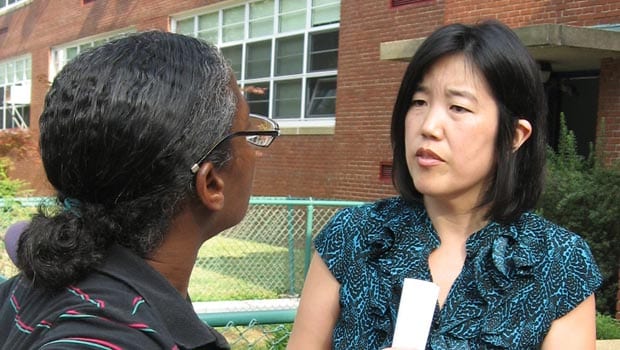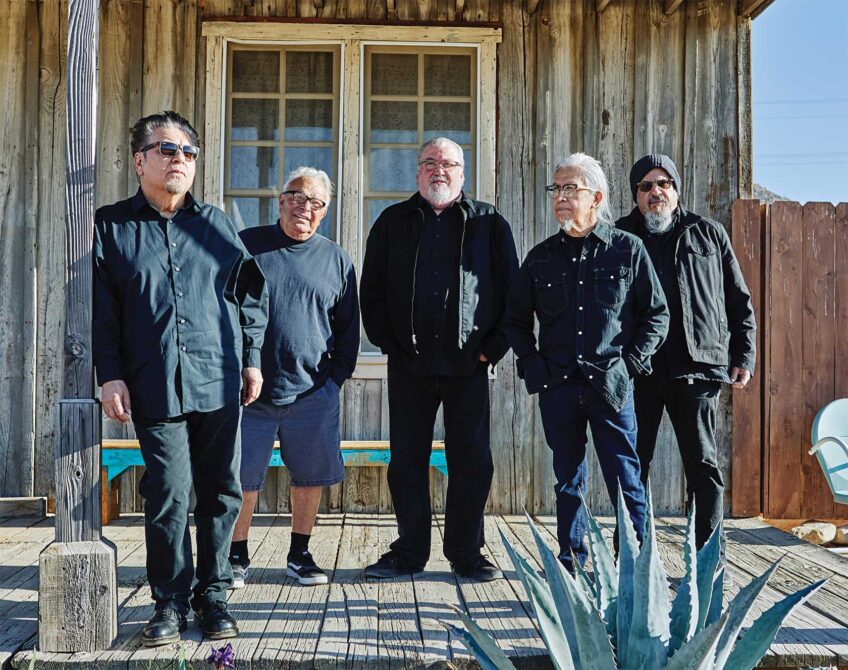Michelle Rhee talks about founding StudentsFirst
Author and education reform advocate says setting high expectations for students is key


Michelle Rhee’s book Radical: Fighting To Put Students First.
Michelle Rhee was born on Christmas Day, 1969 in Ann Arbor, Mich. A first-generation Korean-American descended from a long line of educators, she embarked on a career as a teacher in inner-city Baltimore soon after graduating from Cornell University with a B.A. in government.
However, her star really started to rise after she earned a master’s degree in public policy at Harvard University’s prestigious Kennedy School. She was subsequently recruited by NYC School Chancellor Joel Klein to help handle his stalled contract talks with the teachers’ union.
And on the strength of Michelle’s negotiations with United Federation of Teachers President Randi Weingarten, Klein recommended his feisty protégé for the top job in Washington, D.C. Their public schools were among the worst performing in the nation, and Rhee found a very receptive Mayor in Adrian Fenty, who gave his new hire free reign to overhaul his troubled system in accordance with her controversial reforms.
She would spend a stormy three years in the public eye as the embattled schools chancellor of the Washington, D.C., public schools. Employing a “kids first” philosophy, Michelle chopped heads in the top-heavy administration, firing dozens of dead wood principals, laying off hundreds of extraneous office workers and closing over 20 underperforming schools.
Although students’ test scores improved dramatically during her brief stint in the position, her anti-union stance proved unpopular. Mayor Fenty’s reelection bid was basically a referendum on whether the city wished to continue with Rhee’s scorched earth philosophy. When he lost, her days were numbered, so she handed in her resignation rather than wait around to be fired.
Michelle, a mother of two, is married to former NBA star Kevin Johnson, who is now the mayor of Sacramento, Calif. She is the author of “Radical: Fighting To Put Students First.” Earlier this year, she was the subject of a Frontline profile, “The Education of Michelle Rhee.”
Tell me a little about your new organization, StudentsFirst.
I started StudentsFirst when I left D.C., essentially because of what had happened to my boss [Mayor Fenty]. I had very naively taken the job believing that, if we worked hard for the kids and produced results, people would want it to continue. But I learned that that was absolutely not the case, that people were less focused on the results than on the process and the personalities. The problem was that we didn’t have any political muscle through which we could support and defend a person like Fenty. So, that’s why I founded StudentsFirst, to create an environment where we have a powerful political force advocating on behalf of children. We now have 2 million members across the country who are putting pressure on their elected officials to put the right laws and policies into effect.
Where did you get the confidence that you could create a national organization from nothing?
From a combination of things. Being able to announce the launch on The Oprah Winfrey Show, and saying that we were going to get a million members and raise a billion dollars in a year was huge. People thought I was crazy. But I have long believed that there are many people out there who are incredibly frustrated with the educational system. I felt that if we could capture that sentiment, and mobilize them to take action and organize others in their communities, then this could be a very powerful force.
The cynic in me wonders whether your organization really has widespread grassroots support, or if it is basically being backed by some arch-conservative billionaires like the Koch brothers.
This is driven by everyday people. Our average donation is $84. I get why the other side might try to frame it as a right-wing movement, but the bottom line is I am a life-long Democrat. My husband is a Democratic politician. I was appointed by a Democrat. The vast majority of the goals on our policy agenda are similar to what President Obama and his administration are advocating.
I tried teaching in an inner-city public school after I first graduated from Cornell, but was quickly disillusioned by things like social promotion and low expectations. So, I admire how you took a similar path, but stuck in there, perhaps because you came from a family of educators.
One of the reasons I wrote the book “Radical” was to tell my story and to talk about my journey with educational reform, so people can understand why I have the views I have today. I have an absolutely unshakable faith in kids, grounded in the fact that I worked for three years in one of the worst public schools in Baltimore, with kids most people would write off because of their backgrounds. But, when I set high expectations, at the end of the day, these kids went from scoring at the bottom on standardized tests, to scoring at the top, despite their unfortunate circumstances. I actually saw what could happen with my own two eyes. That experience set a light bulb off in my head that any kids could do it, if you create the right school environment. That’s what drives me every day. Why wouldn’t we as a country want to do that?
What do you think of school vouchers, charter schools, lotteries and heartbreaking documentaries like “Waiting for Superman”?
If you lived in a neighborhood with a failing public school, and you had an opportunity to take advantage of a voucher or other program that would allow you to send your child to a better school, there isn’t a single parent who would say “no.” That’s why movies like “Waiting for Superman” are so helpful. They show things from the perspective of inner-city families who would do anything to ensure a decent education for their kids. That shatters stereotypes in a very powerful way.
What was the biggest lesson you learned from your experience in D.C.?
We were taking the right steps to fix a dysfunctional school system. But I didn’t realize at the time that how you do things is just as important as what you do.
How can we empower educational systems on the local level that have such drastic financial concerns that they’re making very round corners?
We are in tough economic times right now, and the first thing we have to do is look at how we’re spending the dollars that we have, and at what kind of return on investment we’re getting. Because I think it will show that spending more money without fixing the fundamental flaws in the system won’t produce anything different in terms of results. In D.C., we were spending a whole lot of money on things that had no positive impact on students’ achievement levels.
How committed are you to saving art programs in schools?
Even though we closed 15 percent of the schools in D.C. my first year, we were able to put an art teacher, a music teacher, a P.E. teacher, a librarian, a nurse and a guidance counselor or social worker at every school in the district, whereas before, only the wealthy schools had art teachers, because that community could have an auction and hire art teachers on its own. We pooled the resources for all the schools and thereby broadened the resources available to all the students in the district, which I think was critical.
What is your earliest childhood memory?
Being in nursery school, and hearing the teachers saying, “She’s slow.” I remember thinking, “You don’t know anything about me.”






